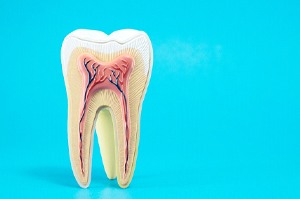Root Canal Therapy – Newington, CT
Save Your Damaged or Decayed Tooth
The term “root canal” is widely misunderstood. Most people believe that it refers to a painful dental treatment. In fact, the root canal is simply part of a tooth’s anatomy; it is the area within a tooth that contains a soft substance called pulp, which includes nerves, blood vessels, and connective tissues. Root canal therapy, on the other hand, is a dental treatment, but it is not the dreadful treatment that many people imagine it to be. It actually has the potential to relieve severe dental pain and save a damaged tooth from extraction.
What Is Root Canal Therapy?

When decay or trauma damages the pulp inside a tooth, root canal therapy is often necessary. The procedure typically goes like this:
- We make sure the tooth is numb. We also offer sedation to help our patients remain calm and relaxed during the procedure.
- We create a tiny hole in the tooth’s outer layers in order to access the pulp. Then, we use special tools to clean out the damaged area and remove the tooth’s nerve.
- We use a special material called gutta percha to fill in the tooth. Then, we seal it.
- Following root canal therapy, it is usually necessary to place a crown on top of the tooth to protect it from further damage.
After the numbness wears off, the treated area may be somewhat tender and sore. However, medication can help to alleviate such symptoms. Most patients are pain-free after just a few days.
Do I Need Root Canal Therapy?

The following are some common signs that indicate root canal therapy might be necessary:
- You have a throbbing, extremely painful toothache
- One tooth is darker than the ones around it
- A tooth is experiencing prolonged sensitivity to hot and cold temperatures
- There is a pimple-like bump on your gums
- One of your teeth is cracked or chipped
If you suspect you need root canal therapy, visit us as soon as possible. Delaying treatment could give an infection a chance to worsen and spread beyond the tooth. In some cases, such infections can cause severe systemic illness and even become life-threatening.
Is Root Canal Therapy Better than an Extraction?

In many cases, either extraction or root canal therapy can relieve dental pain. However, we always recommend that you try to save your natural teeth if possible. That is because the loss of even a single tooth can lead to serious consequences for your oral health later on. For example, the adjacent teeth may begin to drift out of place, causing a misaligned bite. You will also lose bone density in the portion of the jaw that once supported the lost teeth. You could choose to replace the lost tooth, but that can present an additional, significant expense.
Would you like to learn more about root canal therapy and how it may be able to benefit your oral health? Contact Family Dental Practice of Newington today.
Understanding the Cost of Root Canals

The cost of a root canal can vary depending on a few different factors. During you consultation, our team will provide you with a personalized price estimate. We will also assist you as you consider your payment options, such as insurance and financing. We want to make it as easy as possible for you to afford your treatment!
Factors That Can Affect Root Canal Cost

There are a number of factors that can impact root canal cost for patients in Newington, including:
- The type and location of the tooth. Teeth toward the front of the mouth tend to be simpler and easier to treat than those toward the back. Therefore, root canal therapy for them may cost less.
- The overall complexity of the case. We can usually perform root canal therapy right here at Family Dental Practice of Newington. In some cases, though, we must refer patients to a specialist, who may have a pricing structure that is quite different from our own.
- Additional services. You will likely need a crown after your root canal therapy, which will add to the total cost of your care.
Is It Cheaper to Pull My Tooth?

The upfront cost of a tooth extraction is often lower than that of root canal therapy. However, you should look beyond the initial price and think about the long-term financial implications of your treatment. If you undergo an extraction, you should get the tooth replaced as soon as possible. Otherwise, you are likely to suffer from complications, such as dental drift and future tooth loss. A bridge or implant can cost quite a bit of money.
Root canal therapy, on the other hand, is often more affordable in the long run. It preserves your natural tooth and has the potential to provide you with many decades of reliable dental function.
Does Dental Insurance Cover Root Canals?

Yes, it is normal for dental insurance policies to cover root canal therapy. Depending on your plan, the treatment may be classed as either a minor or major procedure. Therefore, your coverage rate might be anywhere from 40 – 80%. Our team can help you understand how your benefits apply and file claims on your behalf. We accept more than 200 different plans, so it is likely that we can help you to enjoy the lowest out-of-pocket fees possible.
Other Options for Making Root Canal Therapy Affordable

Insurance is just one provision that may help you afford care. Other valuable resources include:
- As an emergency dentist, we know that dental care can be an unexpected expense. IT is often easier to pay for it over time. Most of our patients qualify for low-interest payment plans through CareCredit, a third-party lender.
- Essential Dental Plan. If you do not have insurance, consider signing up for our discount plan. You will be able to use your benefits right away, and you can enjoy reduced fees on virtually all of the procedures we offer.
Financial concerns should not prevent you from enjoying a healthy smile. Get in touch with us today to learn more about root canal therapy and its cost.
Root Canal FAQs

A root canal in Newington may be exactly what you need to end your toothache and protect your oral health. Before you commit to this procedure, though, you may want to learn more about it. That is completely understandable. To help you out, we have compiled the following list of FAQs, along with succinct, to-the-point answers. If you do not see your specific concern addressed, please give us a call so we can personally assist you.
How Long Does It Take to Recover from Root Canal Therapy?
Each person heals at a different rate. In most cases, though, patients are able to go back to work or school the day after their root canal therapy. However, if you have a job that requires strenuous physical labor, you may want to take at least 2 – 3 days off because too much activity could slow down your recovery.
It is common to experience oral soreness for several days. Taking pain relivers, along with consuming only soft foods, can make you as comfortable as possible. You should also stick to a normal oral hygiene routine, but you should be very gentle around the treated tooth.
If you have questions or concerns at any point during your recovery, do not hesitate to reach out to us for guidance.
How Long Do Root Canals Last?
Root canal therapy boasts a remarkably high success rate. In fact, most treated teeth are able to provide a lifetime of function following the procedure. Of course, in some cases, a root canal can fail. If the original treatment was not as thorough as hoped, endodontic retreatment might become necessary. If the crown on the tooth becomes damaged or is placed too late, the tooth might suffer from a reinfection. Our team will provide you with instructions to reduce the chances that your tooth will suffer future problems.
Will I Need Antibiotics Before or After My Root Canal?
Most patients do not need antibiotics either before or after root canal therapy. They are likely to be prescribed only if you have a medical condition that greatly increases your risk of developing an infection following an invasive dental procedure. Your dentist in Newington will carefully review your medical history in order to determine whether you should take antibiotics.
What Happens if You Wait Too Long for a Root Canal?
A unique feature of teeth is that they cannot heal themselves. Therefore, if you have one that is damaged or infected, the problem is only likely to get worse if you postpone treatment. If a root canal is necessary, you should get the procedure performed as soon as possible. Doing so can reduce the risk that you will require an extraction. It will also put an end to your toothache and lower the chances that an infection in your tooth will spread to nearby tissues.
